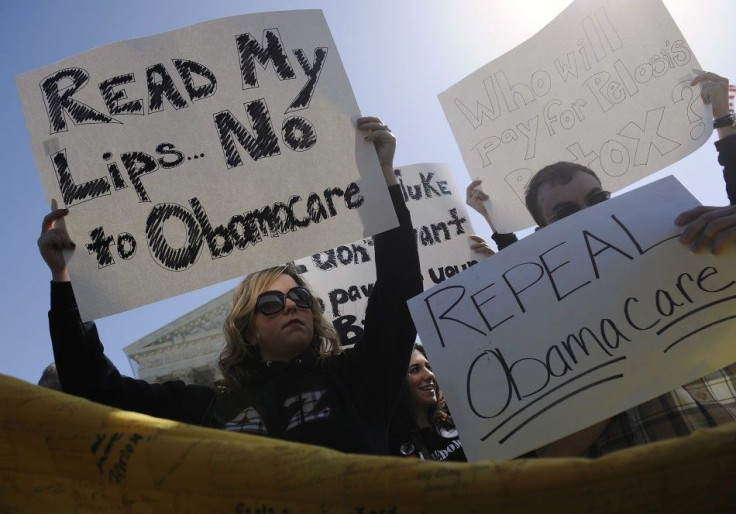Americans Want New Health Care Reform Law If 'ObamaCare' Is Overturned

More than 70 percent of Americans want the president and Congress to develop new health care reform legislation in the event that the U.S. Supreme Court overturns the Obama administration's health care law, according to a new poll. But just what the public hopes to see in a new law is still not clear.
Only 19 percent of 1,007 respondents to an Associated Press/GfK poll released on Wednesday said they wanted lawmakers to preserve the health care bill as is, even if it is overturned by the nation's high court this month. A far larger 77 percent said Congress should develop new legislation, likely a version that does not include the individual mandate to purchase health care, the requirement that opponents generally argue is unconstitutional.
Yet, overturning the mandate -- an issue that was the target of aggressive questioning from Supreme Court justices during oral arguments in the case earlier this year -- could actually increase the cost of health insurance for many Americans, according to the Congressional Budget Office, which estimates that premiums for individuals who directly purchase their plans from private insurance companies could increase by 15 percent to 20 percent. That's because, without the mandate, experts predict the elderly or people with health problems would purchase health care while the younger and healthier would postpone purchasing insurance, driving up the overall cost of coverage.
While poll after poll has reported that half of the country wants the entire health care law to be struck down, there are several extremely popular provisions of the legislation that are already in effect. In fact, they are so popular that House Republicans are already crafting bills to keep consumer-friendly aspects of the law in place, Politico reports, including allowing adult children to stay on their parents' insurance plans until age 26 and forcing insurance companies to provide coverage for individuals with pre-existing conditions.
Health insurance giants such as UnitedHealthCare, Aetna and Humana have already announced they will uphold those provisions, as well as another that says companies must provide preventive health care services without out-of-pocket costs to consumers, regardless of whether the health care law is overturned.
Just why the law, commonly derided as ObamaCare by opponents, strikes such a negative chord with Americans, is unclear. However, new research from the Pew Research Center's Project for Excellence in Journalism (PEJ) points to one major source of the confusion: the news media.
In a meticulous analysis of how the media covered the law between the summer of 2009 and December 2011, the organization noted two major trends that have influenced Americans' perception of the legislation. First off, almost half of all news coverage on the subject has almost solely focused on the political controversies surrounding the law, instead of explaining what it would actually do when implemented. Second, opponents of the law have been incredibly successful in the so-called messaging war surrounding the issue.
The PEJ analysis notes that terms closely associated with opposition arguments -- such as more government involvement, more taxes with health care reform and rationing health care -- have been far more present in media reports than terms associated with arguments supporting the bill, such as more competition and pre-existing conditions.
The terms used by opponents have saturated news coverage, according to the analysis, which found they were nearly twice as common as language used by supporters.
That, combined with almost obsessive coverage of the political squabbles and legislative process influencing the law's implementation, may have skewed the public's opinion of the bill. Many may not even be completely aware of what the bill would do, or of the current state of U.S. health care. Pew reports that between June 2009 and March 2010 -- when health care was the primary story dominating the news cycle -- less than a quarter of that coverage outlined what the law's various proposals would actually do. At its peak, only 9 percent of the coverage focused on the state of the health care system in the U.S., even though almost 50 million people in the nation currently lack any form of health insurance.
© Copyright IBTimes 2025. All rights reserved.





















